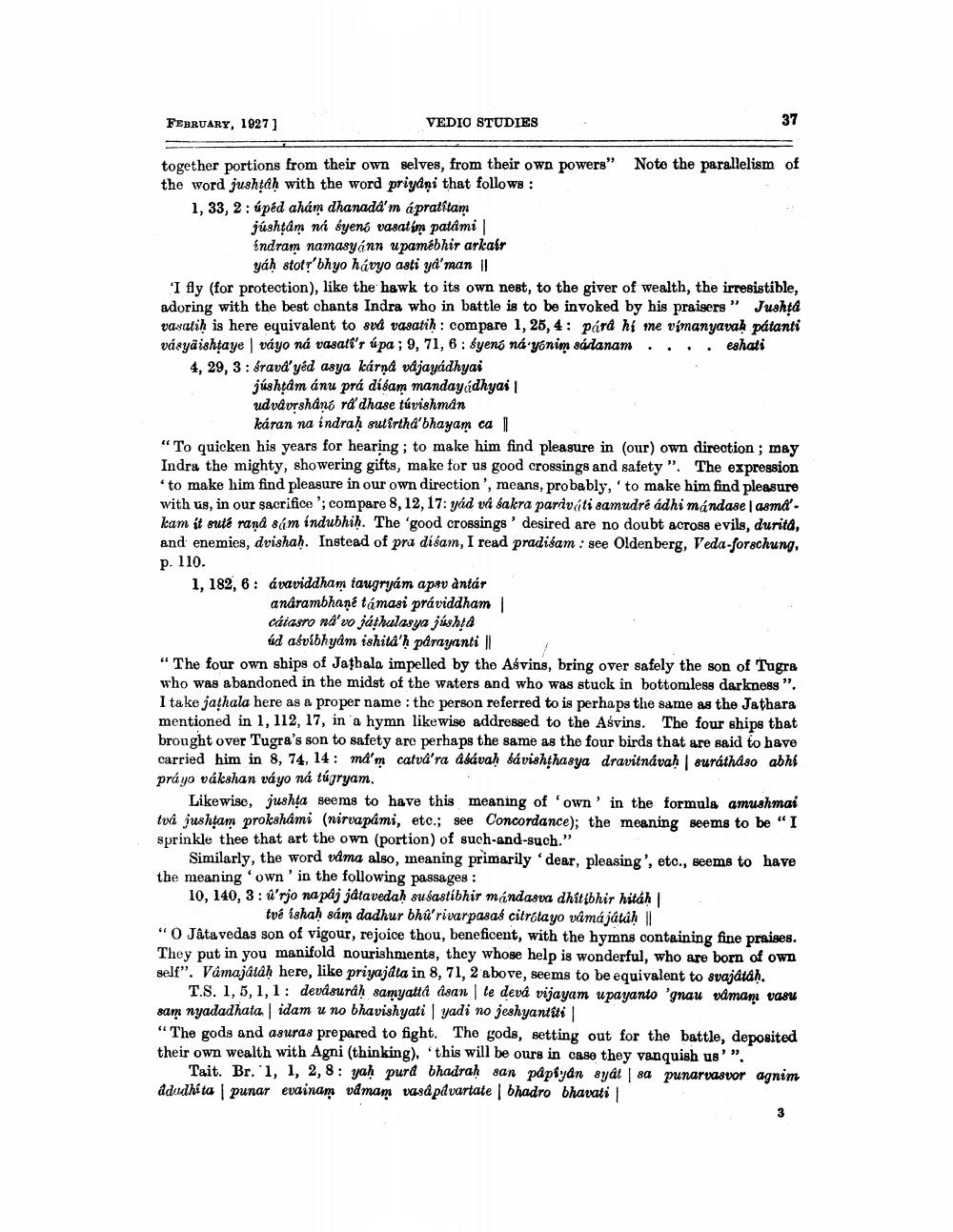________________
FEBRUARY, 1927]
VEDIO STUDIES
together portions from their own selves, from their own powers" Note the parallelism of the word jushtah with the word priyani that follows: 1, 33, 2: úpéd ahám dhanada'm ápratitam
júshtam ni syenó vasatin patami indram namasyann upamébhir arkair
yáh stotr' bhyo hávyo asti ya' man | 'I fly (for protection), like the hawk to its own nest, to the giver of wealth, the irresistible, adoring with the best chants Indra who in battle is to be invoked by his praisers" Jushta vaxatih is here equivalent to svd vasatih: compare 1, 25,4: para hi me vimanyavak pátanti vá&yäishtaye | váyo na vasati'r úpa ; 9, 71, 6: yenó ná yonim sádanam ...eshati 4, 29, 3: Srava'yéd asya kárna vajayádhyai
júshtâm ánu prá disam mandayudhyai udvd urshånó ra dhase túvishman
káran na indrah sutîrtha'bhayam ca 1 « To quicken his years for hearing; to make him find pleasure in (our) own direction; may Indra the mighty, showering gifts, make for us good crossings and safety". The expression
to make him find pleasure in our own direction', means, probably, 'to make him find pleasure with us, in our sacrifice '; compare 8, 12, 17:yád và sakra pardviti samudré ádhi mándase | asmá'. kam it suté rand sam indubhih. The 'good crossings' desired are no doubt across evils, durita, and enemies, dvishah. Instead of pra di&am, I read pradišam : see Oldenberg, Veda-forschung, p. 110. 1, 182, 6: ávaviddham taugryám apsv antar
andrambhané támasi práviddham cátasro ná'vo játhalasya jushta
úd aśvibhyam ishita'h pdrayanti || “The four own ships of Jathala impelled by the Asvins, bring over safely the son of Tugra who was abandoned in the midst of the waters and who was stuck in bottomless darkness". I take jathala here as a proper name : the person referred to is perhaps the same as the Jathara mentioned in 1, 112, 17, in a hymn likewise addressed to the Asvins. The four ships that brought over Tugra's son to safety are perhaps the same as the four birds that are said to have carried him in 8, 74, 14: ma'm catvá'ra dsávah sávishthasya dravitnávah suráthaso abhi prá yo vákshan váyo ná túgryam.
Likewise, jushta seems to have this meaning of 'own' in the formula amushmai tvá jushtam prokshami (nirvapámi, etc.; see Concordance); the meaning seems to be "I sprinkle thee that art the own (portion) of such-and-such."
Similarly, the word vdma also, meaning primarily dear, pleasing', etc., seems to have the meaning own' in the following passages : 10. 140, 3: u'rjo na pdj jatavedah susastibhir mándasva dhitibhir hitah
tvé (shah sám dadhur bhứ'rivarpasas citrótayo vámájátáh || “O Jata vedas son of vigour, rejoice thou, beneficent, with the hymns containing fine praises. They put in you manifold nourishments, they whose help is wonderful, who are born of own self". Vámajáláh here, like priyajáta in 8, 71, 2 above, seems to be equivalent to svajatah.
T.S. 1, 5, 1,1: devdsurdh samyatta asante devá vijayam upayanto 'gnau vimam vasu sam nyadadhata idam u no bhavishyati yadi no jeshyantiti | "The gods and asuras prepared to fight. The gods, setting out for the battle, deposited their own wealth with Agni (thinking), this will be ours in case they vanquish us!".
Tait. Br. 1, 1, 2, 8: yah purd bhadrah san påpfyan syat sa punarvasvor agnim adudhita punar evainam vdmam vasdpdvartate | bhadro bhavati




